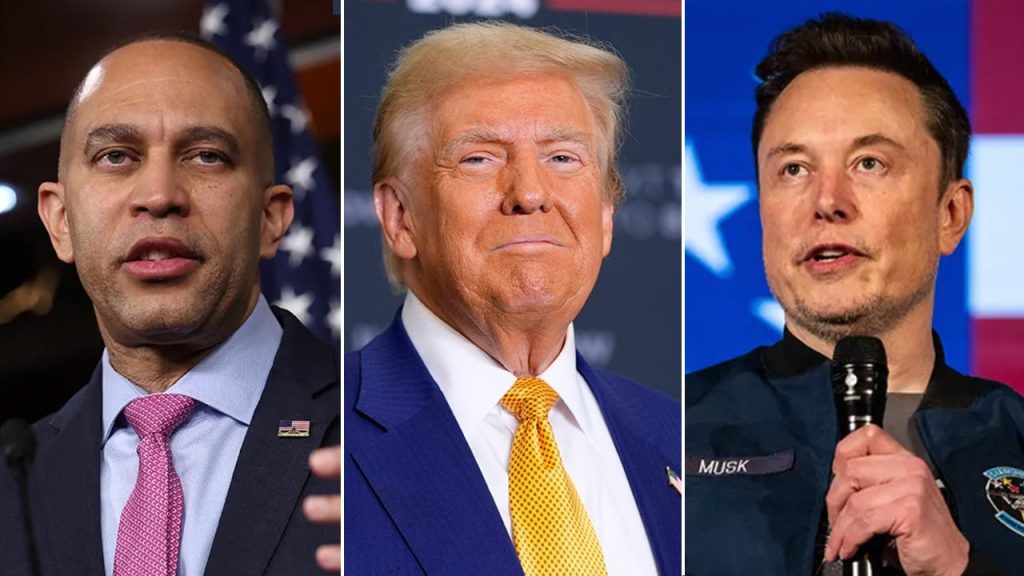House Minority Leader Hakeem Jeffries has vehemently criticized House Republicans for reneging on a bipartisan agreement to fund the government and avert a looming shutdown, accusing them of prioritizing political maneuvering over the needs of the American people. The agreement, painstakingly negotiated between Democratic and Republican leaders in both the House and Senate, would have provided crucial disaster relief funding for communities ravaged by extreme weather events, ensuring the continuity of essential government services. Jeffries emphasized the sanctity of bipartisan agreements, stating that a deal is a deal, and lamented the Republicans’ unilateral decision to backtrack, a move he believes will inflict hardship on everyday Americans. He further accused Republicans of being directed to shut down the government, a charge that underscores the deep partisan divide currently gripping Congress.
Jeffries’ condemnation of the Republicans’ actions extended to social media platforms, where he reiterated his disappointment and emphasized the potential harm to working-class Americans, a demographic often invoked by Republicans. This public denouncement highlights the growing tension and erosion of trust between the two parties. The failed agreement takes place against a backdrop of escalating national debt, which has reached alarming levels and continues to climb at a rapid pace. The recently concluded fiscal year witnessed a substantial budget deficit, raising concerns about the nation’s fiscal health and the long-term economic implications of unchecked spending.
Adding fuel to the fire, billionaire Elon Musk, appointed by President-elect Trump to co-chair the newly formed Department of Government Efficiency (DOGE), publicly criticized the proposed continuing resolution (CR) bill. Musk derided the lengthy document as being laden with “pork,” echoing a common critique of government spending bills. He directly addressed Jeffries’ accusations on social media, suggesting that the public is not as easily fooled as some politicians might believe. Musk’s comments reflect a broader sentiment of skepticism towards government spending and the perceived inefficiencies within the system.
Trump himself has voiced strong opposition to the CR, expressing concerns about its excessive cost and the inclusion of extraneous provisions. He argued that passing such a bill without addressing the looming debt ceiling issue would be a strategic blunder, setting a dangerous precedent for his incoming administration. Trump also criticized the timing of congressional pay raises included in the bill, viewing it as inappropriate given the nation’s economic challenges. He urged Republicans to resist the bill and negotiate a more fiscally responsible solution before his inauguration in January 2025, threatening primary challenges against those who defy his directive.
The proposed CR, a 1,547-page document released after protracted negotiations, has faced significant resistance from conservative factions within the Republican Party. Many hardliners are frustrated with the inclusion of policy riders, viewing them as unnecessary additions to a bill that should focus solely on extending government funding. Among the contested provisions are measures related to healthcare, ethanol fuel, and a substantial allocation for disaster aid. The inclusion of a pay raise for lawmakers, the first since 2009, has also drawn criticism. This internal dissent within Republican ranks further complicates the already challenging task of reaching a consensus on government funding.
The breakdown of the bipartisan agreement and the ensuing acrimony between Democrats and Republicans cast a shadow over the future of government operations. The looming threat of a government shutdown, with its potential consequences for essential services and the broader economy, remains a serious concern. The failure to reach a compromise highlights the deep political divisions within Congress and the challenges of navigating the complex landscape of fiscal policy in a highly polarized environment. The situation also underscores the growing influence of figures like Elon Musk and President-elect Trump in shaping public discourse and influencing political decisions. Their interventions in the debate further complicate the already intricate negotiations and add another layer of complexity to the ongoing struggle to fund the government.

